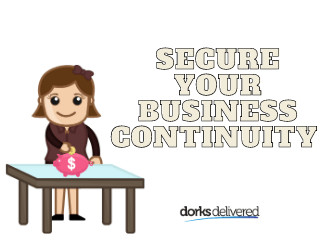The financial crisis in business can be very challenging to deal with and navigate. Several companies have found themselves suddenly forced out of business due to liquidity problems. For business owners, it doesn’t matter how many times they try to prevent this kind of situation—it will pop up periodically due to the changes happening in the market. Businesses are seeing rough spots due to broad market factors, such as excessive debt, overpriced assets, poor financial system and other issues. When you have been building a business or managing one for a while, you have to be prepared and equipped for this kind of situation. You should be aware that the financial crisis occurs in particular industries or even in confined companies due to limiting factors. In this episode, Justine Lalla shares what to do best during a financial downturn.
Josh: G’day everyone out there in podcast land! We’ve got a fantastic guest for you. We’ve got Justine from JPL Financial Management. They do some pretty cool stuff with books around the place here. And we’re going to be talking about what to do with financial management in a downturn. So we’re all experiencing a bit of stress, regardless of what industry you’re in. There’s only a few at the moment that is really thriving, and I have strong feelings that they may be seeing the downturn in the future a little bit further on. Justine, tell me what would be the one thing that you need to keep in mind when facing a downturn?
Justine: I think you need to keep in mind your cash flow and your budgeting. During a financial downturn, you should always have a budget that’s always a good idea and during a financial downturn. You 
Josh: That’s very good advice. I know that we had a bit of a talk offline before we jumped into the episode. Without pointing fingers and saying names, you did say that some people need to have the fingers shaking at them saying what are you doing and get your books in order. That’s a huge thing. We’ve got so many different opportunities are in a fantastic country here, where there are opportunities everywhere. And there’s probably stacks of businesses that are not able to get them or they’re definitely putting you under the pump because they don’t have their bookkeeping in order.
Justine: Yes, yes. So due to COVID-19 and all the grants that been offered by the government, the cash flow boost, and Job Keeper, we’re finding a lot of small business coming to us trying to get the books in order now because they haven’t done so in the past, which is quite surprising. Obviously, in order to manage a business well, you need good information. So you need the records in order. And the only way you can plan for a financial downturn or any sort of planning is good information, good bookkeeping, information that you can rely on and make good decisions in the future.
Josh: Yep. Well, I think it’s all data in, data out. How far behind was the worst? And then how far behind is the average?
Justine: I’ve seen some go as far as a year behind. I know there are more than that behind. Thankfully, they haven’t for me. But yeah, it could go to a year behind. Thankfully, none of our clients is in that situation. They’re all up to date. So, everyone was able to benefit from all of the subsidies and grants.
Josh: Cool. That’s good news. Because yeah, it’s a this is it. There’s a new one every week. There’s one that just came out the other day for another $10,000
Justine: Yes, the Queensland Government grant.
Josh: Yeah, that’s right. And far out. I thought the wave was over. I thought everyone had caught the wave or not.
IT doesn’t have to be expensive. If you’re starting a business and need reliable IT support and services, fill out the form to learn more about $1 IT services.
Justine: Yeah, it’s really good that there’s so many out there. Obviously, you need to have everything in order. And you need to know what is out there. So you can benefit from all these things. So it’s good to talk to a professional that can advise you what you can actually apply for because you don’t want to miss out.
Josh: Not at all. Exactly. And we just say the more waves coming in as time goes on.
Justine: I would say with those grants, utilise it efficiently, you know, make the most out of it in your business.
Josh: So, obviously, talking about financial management a downturn with these grants that come through there, what do you think their mindset should be like? For instance, some people will be like, okay, like, let’s just use these grants. And this will allow us to just ride the wave through and then everything will work but we don’t know what’s on the other side. Versus other people which will be like reduce everyone’s hours, stand people down, remove any excessive expenses or expenses that we can absolutely that are not must-have parts that absolutely run the business and then still get the grants so that you can ride the wave a little bit longer, even though it might have crippled your business for a longer period of time. What do you think is the best way to approach that?
Justine: Yeah, good question. So in terms of these grants and these cash flow boosts and everything that you can get at the moment, I think that should be tied to your contingency budget or plan. And you should factor that in as to how you’re going to boost your cash flow. How are you going to get your business back on track once everything starts opening, and how you can then put your stuff on to increase hours until your business is running back to normal and your sales are hitting the usual numbers that it should be. So those grants and subsidies should be factored into that contingency plan. You shouldn’t just get it and then squandered all in one go.
Josh: Okay. That’s good advice. I’d say like you said that a lot of it comes down to your team and the management of where your goals are with where you’re going. We faced the problem internally, I can’t say that we got away scot-free, we’ve had a downturn. And that’s because the businesses we rely upon had a downturn, and sadly, two of them that were running 40, 50 people businesses, one of them the other ones 50, 60 people businesses went down to three and five and then another one that was also quite large went down to nothing. They’ve gone bankrupt officially now out of business, very happy to say that our team has stuck with us. And we’ve held together like a tight family. I’ve had even some of the staff say, look, although I know you’re saying we should be at 80% they still have to work the full hundred. One staff member said, Look, what can we do here and he said, happy for you to not pay me for the next two months and we can just work something out after that. And the environment and the way that you bring up your team and you talk to your team will definitely help with the situation.
If you need assistance with your automation, talk to a dork. Fill out the form below to book a free one-hour consultation.
Once you’ve got the grants, would you be saying hold on to them, hold on to the money or pivot your business or think about that idea or accelerate at some bit? Some people have been spending heaps of money on marketing to use it now to be able to put their business forward. Some people have been pulling back completely and saying, let’s just remove every overhead and just sit here until something happens.
Justine: Look, it’s gonna be a little bit different for every business. And depending on where they are with sales, I know a lot of businesses have started doing a little bit of sales, which is good. A lot of people have this stuff only on job keeper, some of them have staff working a few days a week. So it really all depends on what your expenses are like, and what sort of revenue you are expecting. I think those are the factors that you should look at first before determining what you could potentially do with that extra boost of cash. It’s great to be able to use that to increase your cash flow so that when 
Josh: Like it’s just shifting risk really just working out what is the best thing that you can do with the money that’s come in.
Justine: Yes. And it’s really important to utilise those funds efficiently. And during an economic downturn, you want to make sure you’re using it in an area where you’re going to see some sort of benefits, you know, it’s gonna make a difference in your business.
Josh: For us internally, we decided you know, everyone has those products and those things, they go, oh, that’s nice. And you buy into it, and then God, we don’t really need that. And so, we’ve trimmed the hedge, so to speak, we’re now in the main machine and although some of those things, that’s a really nice report that we’re getting once a month, and we went, is it worth $600 a month for that report? No. Get rid of that.
Justine: Yeah. I think during this sort of time, you should look at your nice to have things or must-have things and wait.
Josh: Yes, absolutely and, and start cross-checking everything. And this isn’t just for business. This is in your own personal life. I looked across the properties that I have, all of the insurances, I looked across the insurances for the cars and made sure that I wasn’t paying too much. And just making a few phone calls, I think was an hour total time on the phone. I saved $1,000 a year. And I thought that’s pretty good.
Justine: Yeah, that’s awesome, that’s excellent. Even your electricity bill means companies that call and seek out the best rates. There are so many areas that you can decrease costs if you spend some time analysing your numbers.
IT doesn’t have to be expensive. If you’re starting a business and need reliable IT support and services, fill out the form to learn more about $1 IT services.
Josh: Yeah. And if and as I said, it doesn’t take that long to do like a some of the data centre and expenses that we had, we rang them up and we went from, for one of them is $600 a month, which dropped down to $400 a month. Another one was 1400 dollars a month that was dropped down to $800 a month. Yeah, I thought, well, this is great. And it doesn’t take long. And we’ve had customers come to us, and ask us and say, hey, lookup, we’re not doing well, because of this situation, what can we do? And everyone’s in the same boat. And we’re all here to help, really. That’s one of the great things about this, this beautiful country we’re in. We’re not full of arseholes. There’s a few of them. But generally speaking, we’re here to help everyone and we want only what’s best for everyone.
Justine: Yes, definitely the same with us. I mean, we’ve offered our clients some discounts to get through these tougher months because obviously, the flow-on effect to everyone so when we can help with definitely trying to do that.
Josh: You’re in a fantastic position, I guess in where if they want help with some of these different grants, they get money. If they get money, you can get paid. So everyone wins. If they don’t get it, it’s kind of free money you’re getting paid for on the results really. You have a bit of a different way of billing people as well, which I very much like. Would you like to tell everyone about that?
Justine: Yes. So we tend to charge our clients a fixed weekly or monthly rate, which entails a variety of services that they require for their business. So you can choose whether you want to pay for that weekly or monthly. And with that, there’s no additional cause for any phone calls or emails or any questions that you may have. I don’t think you generally contact your accountant if they are charging you per minute. We like our clients to, you know, ask questions, know their numbers, learn more, because if they don’t learn any more, and ask the right questions, they’re not going to do any better. So we want them to succeed, which is why we like them to ask questions. And most of our customers love that model, because they know there are no surprises in the cost, they can budget for it effectively. And there’s nothing additional to that.
Josh: I love it. And a model that we went to for it for the exact same reason you’ve just said that actually. So in 2011, we noticed a bit of a problem. So 2007 the business started out. 2010, we’re still charging people per hour. And then we noticed that as we were getting problems fixed faster and faster, and using better technology, we’re getting paid less and less, and the business was less profitable, the more experienced the staff were. And I thought this doesn’t make any sense. So there are these cowboys out there charging the same price. And in one instance, there’s a job we got finished in 45 minutes that had someone else already working on it for 10 hours. And I thought, how didn’t they do this in 10 hours, it was a simple problem. And then I thought, we’ve got to change the model. It’s the best thing we ever did because it gives us a reliable income. And it makes sure that our customers have a known expense, as you said, and it means that when the receptionist calls up and says, hey, we’ve got a problem, this isn’t happening. It gets looked at with the same level of detail than any of the C level people.
Do you need help with backup and recovery? Fill out the form to get in touch with a Dork.
Well, before the C level people call up and they don’t have time to get that problem fixed with a receptionist even though it might be costing them a couple of hours a day or something because things are loading slowly or things aren’t working as efficiently as they could. And that ultimately is costing the business heaps. If you’re in this financial downturn, and you’re looking at a way to change around how your business is working, this would be a great time to sort of brainstorm around that. You’re there as a soundboard for different things like this, is that right?
Justine: Yes, yes, definitely. We work on a range of things for our clients. And it all depends on the services you require. Our key focus is, you know, management of your business. So cash flow, budgeting, making sure you have good reports at the end of the month. So wherever they are variances from your actuals to your budget, you know, we sit down with the owners, and we go through, you know, the reasons why this may be occurring. And then we look at ways you know, like you said, where you can call up a few places like your insurance and reduce things. These are areas that we advise our clients on.

Justine: So we use a benchmarking for our clients. So our budgets are looked at against that benchmark. And then, at the end of every month, when we do your monthly reports, we look at your profit and loss against those benchmarks and try to work out why is there such a variance. So there definitely are benchmarks that you can use and use that for your budgeting so that you know what other businesses in your industry are doing in terms of their percentage for wages against sales, cost of goods, for example. So it’s very, very good and efficient to use benchmarks, I think in your business.
Josh: I don’t know what other people are spending I don’t know for 20 per cent’s right or 50% is right or whatever else.
Justine: Yeah, you need the industry benchmarks.
Josh: I know that it’s working.
Justine: I think you get an idea of what the benchmark is around those spin. Just to give you an idea.
Josh: Yeah, that’d be good. You have to send me across something for IT, and we’ll see where we’re at. So the fixed fee for accounting. Did you start the business doing that? Or is that something that came about afterwards?
Justine: We started the business doing that, because I know that’s a little bit different from what other people are doing. And whenever I have worked before, prior to my joining the company, an accounting firm would have done the work. And when I saw the bills that these companies were receiving from these firms, it was quite shocking. So I thought that I’d like to do something different and my target market is small to medium-sized businesses. And I think this is a much more affordable way for them to use our services. And every business needs to have good financial management. And so, this is an area that we love helping them in. And I think the fixed fees work well with small to medium businesses.
IT doesn’t have to be expensive. If you’re starting a business and need reliable IT support and services, fill out the form to learn more about $1 IT services.
Josh: I completely agree. If you know that you can ask the question whenever you don’t feel as uncomfortable about asking it. My first accountant, sorry for listening, Mr First Accountant. I knew when I walked in, the clock was ticking. As soon as I went grab those mentos off his desk and we’re talking, the clock is ticking.
Justine: Don’t you feel stressed when you know that clock is ticking?
Josh: When he’s like, Josh, what do you do in your spare time?
Justine: Oh, does it matter right now?
Josh: I’m like nothing I do Nothing. I do absolutely nothing. I have the most boring life ever. Let’s just talk about what I’m here for. Cos he’d be like oh, yeah. So how’s the family? I got this new car. And I’m going I don’t care so much. It stresses me because then I wasn’t asking the right questions. I wasn’t saying I should my business structure be like this, I would say, what is the fastest way that I can get away from you and stop talking to you. I didn’t build a great relationship.
I noticed that when I was talking to customers, and I talked to them and computers load, things load, things take time to download or whatever, and you’re talking to them. And you can see them looking at their clock looking at the computer looking at the clock, and I’m going, ah, this isn’t good. This isn’t making them feel happy. And then that’s when I’d say something, look why we’re waiting for this. I’m not charging, I feel more comfortable. That’s not a very good way to run a business, is it?
Changing across to we call them continuity plans because we want to keep their business continuity. And so a lot of people call a managed IT service plans. We thought what does that even mean? Continuity agreements where you guarantee their uptime, it’s simple, you continue, you have business continuity, and you guarantee that in your plan. The only problem that I found in changes to the model, two problems. The first one, if you ever see any of your clients at a pub, they’re going to buy your beer, because you have built that fantastic relationship up. So that’s a good problem to have. So I don’t see any problem with that at all. The only other thing I would say, and this comes down to again, the position of where I was at in life, and how about outgoing I was at that stage. When things are working, customers would be like, what are we paying you for? And when things are broken, they ask what are we paying you for? And so that came down to making sure that you had the right reporting in place, 
But overall, as long as you’ve done that, it’s a very, very good way to make sure that in a situation like now, if you are running a per-hour ad hoc type business, you very well could be getting no hours and that could very well be giving you no money and that’s a big problem to be in.
Well, I’ve really enjoyed speaking with you. And is there anything else that you’d like to go through for any of our listeners that are out there too, in regards to JPL financial management?
Justine: Oh, well, I think the piece of advice I could give businesses out there is to manage your cash flows, manage your budget, make sure you have numbers in place, you know, plan for this period of downtime. Make sure you know what your numbers are, you know what your expenses are, cut costs where you can. Talk to a professional, get the most out of your government grants and everything that the government’s offering at the moment. So utilise that efficiently. And yeah, hopefully, we’ll all be back in business full swing pretty soon.
Josh: I completely agree. And anyone out there that is listening and wants to have more advice, or wants to have Justine go through your numbers in your books, jump across the JPLFM.net or JPL financial management, we’ll put a link in here so you can see where to go from there.
And yeah, everyone just stays healthy. Stay on top of your books. Don’t let things go behind. And I think, pay yourself don’t pay yourself and then not be able to get some of these grants and make sure you’re talking to someone that can give you the right advice and set the right wind in your sails to guide you to where you want to be.
If you have enjoyed this episode, make sure to jump across to iTunes, leave us some love. Give us some feedback. And yeah, stay healthy.
[module-379]




























